Curated for Non-Programmers seeking to enter Tech roles
In Collaboration with Microsoft and IBM Certification
Get mentored by Top MNC Industry Professionals

1:1
Live Interactive Classes
510+
Hiring Partners
100%
Guaranteed Job Referrals
79%
Avg. Salary Hike







Our Data Science and Machine Learning course in India provides python data science training, covering Data Analytics, Web Scraping, Machine Learning, NLP, and Time series forecasting. You’ll also learn Database Management System, Data Visualization with Power BI & Tableau, and version control with GitHub. Gain comprehensive knowledge and expertise in essential Data Science tools and techniques using Python through this course.
Our Data Science and Machine Learning course in India provides python data science training, covering Data Analytics, Web Scraping, Machine Learning, NLP, and Time series forecasting. You’ll also learn Database Management System, Data Visualization with Power BI & Tableau, and version control with GitHub. Gain comprehensive knowledge and expertise in essential Data Science tools and techniques using Python through this course.
Features Built on Industry Insights for Unmatched Success!
Key Program Features
Key Skills Covered
Key Program Features
Key Skills Covered
Skills Covered

Education
Graduates from computer science, mathematics, or a related field

Work experience
Professionals with experience in technology background

Career stage
Early to mid-career professionals seeking career leap

Aspirations
Ambitious individuals aiming for hands-on experience
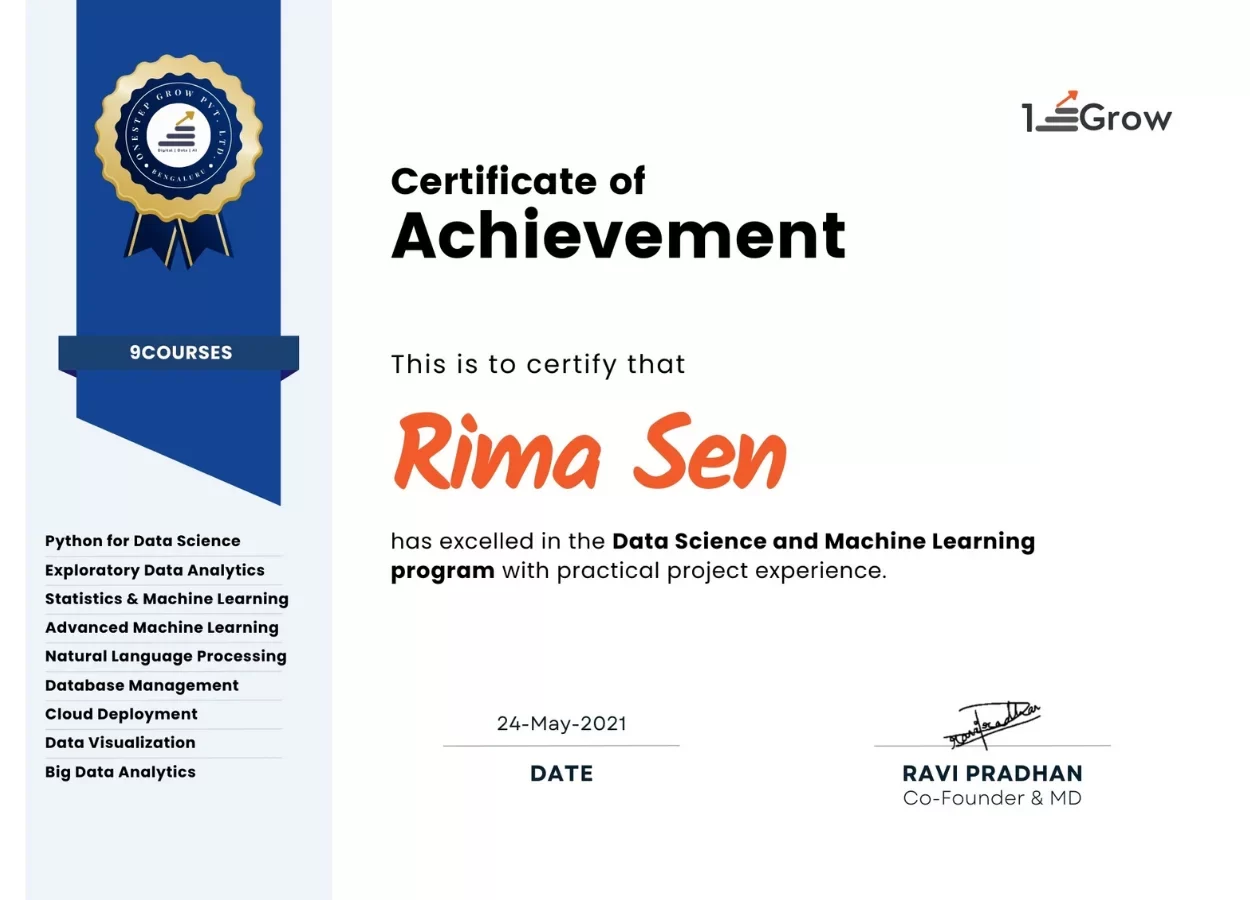
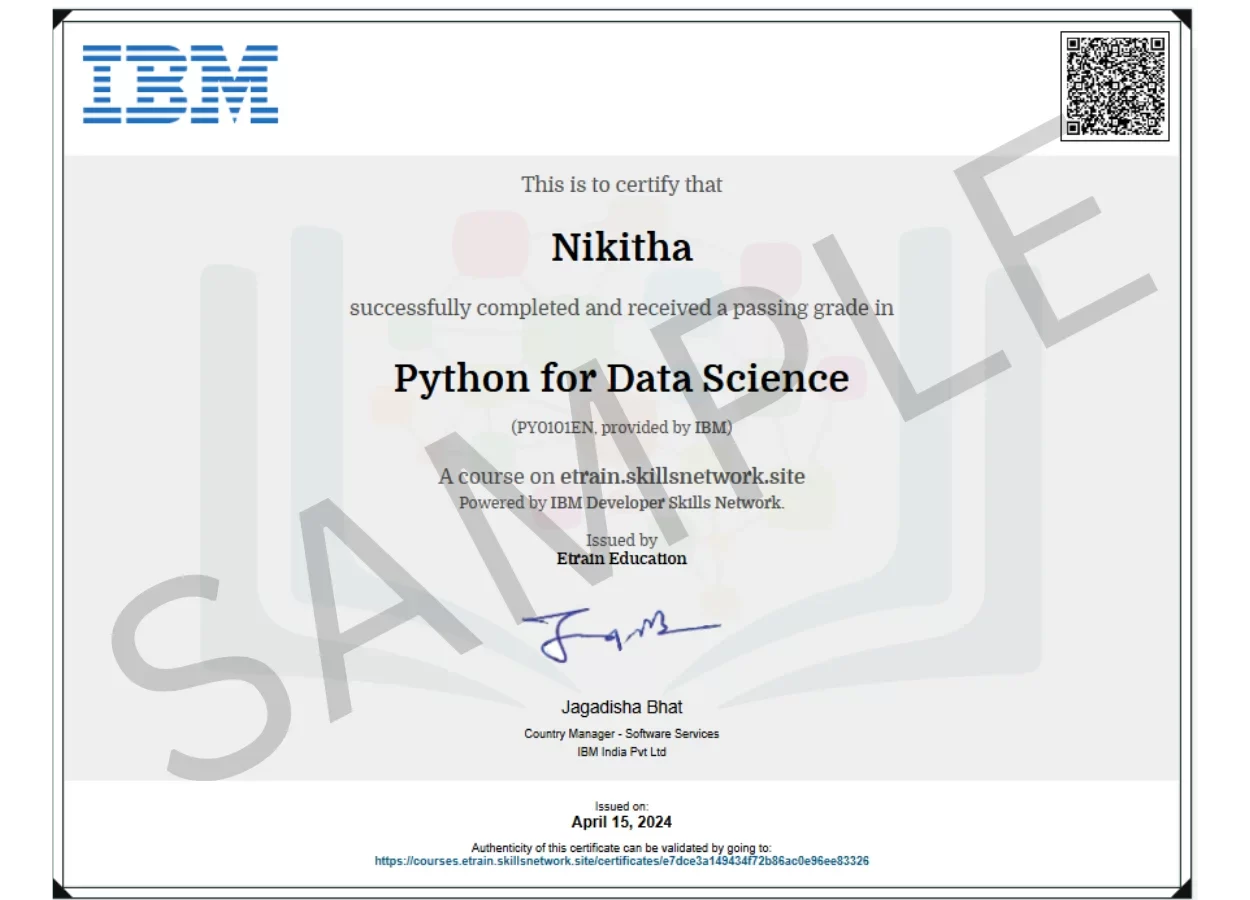
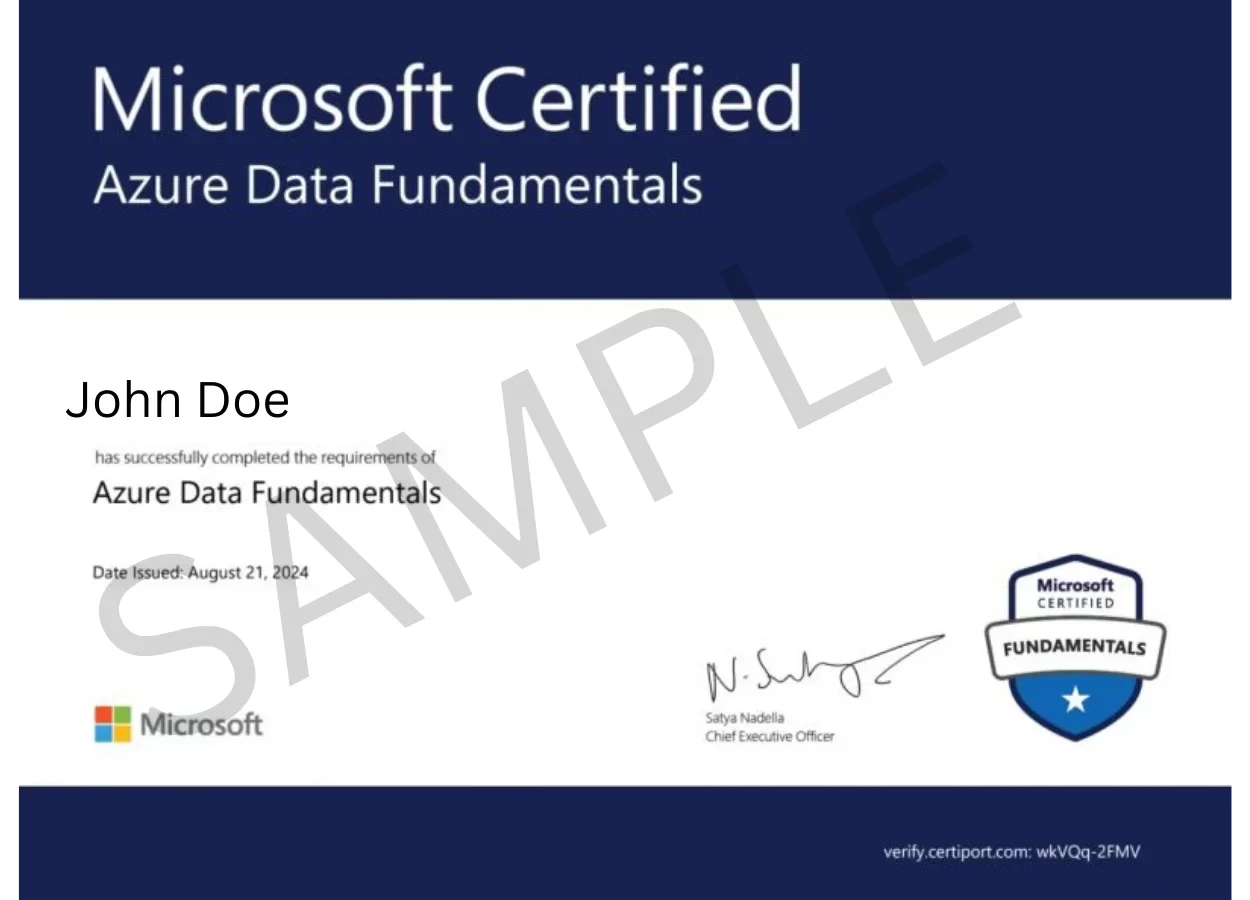
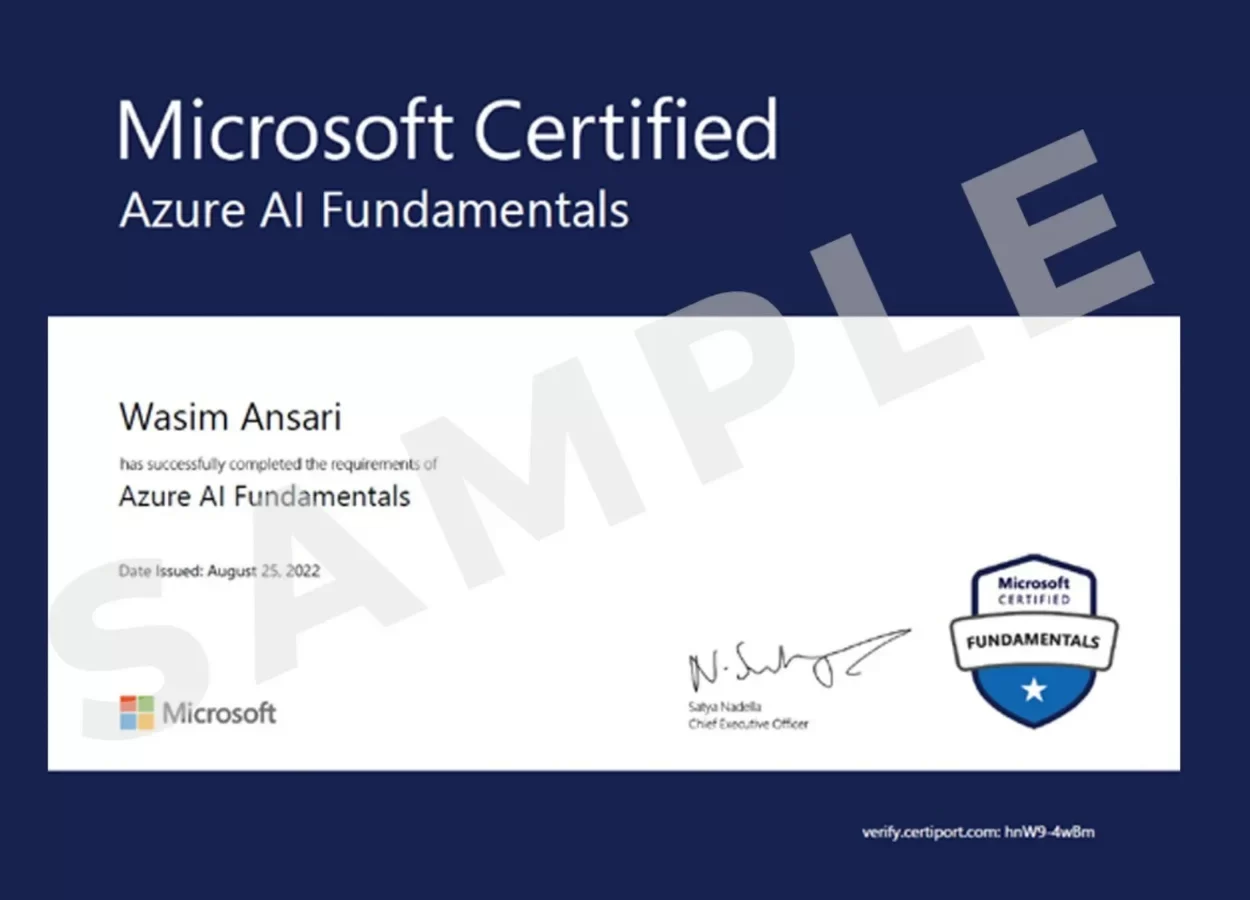
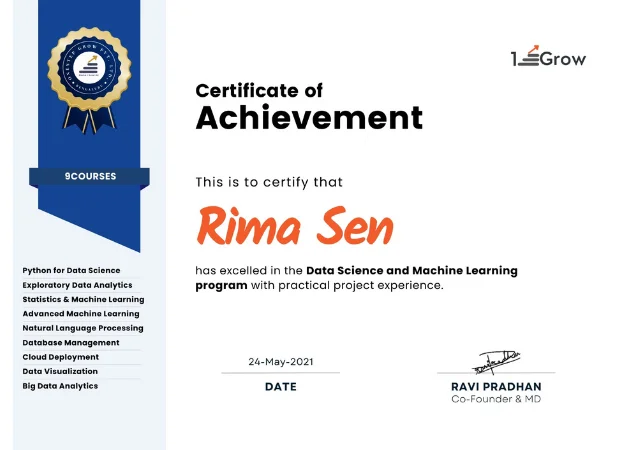
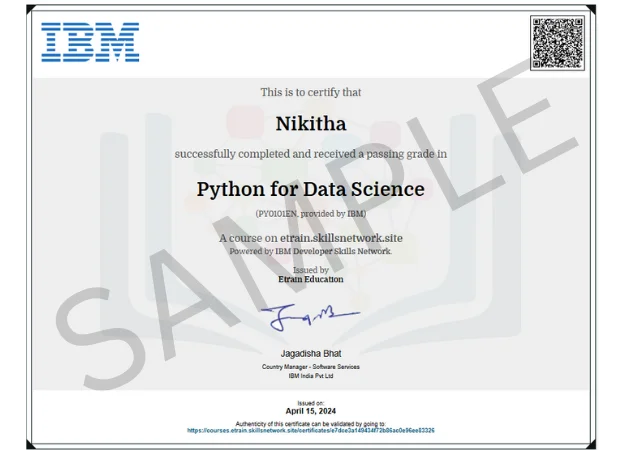
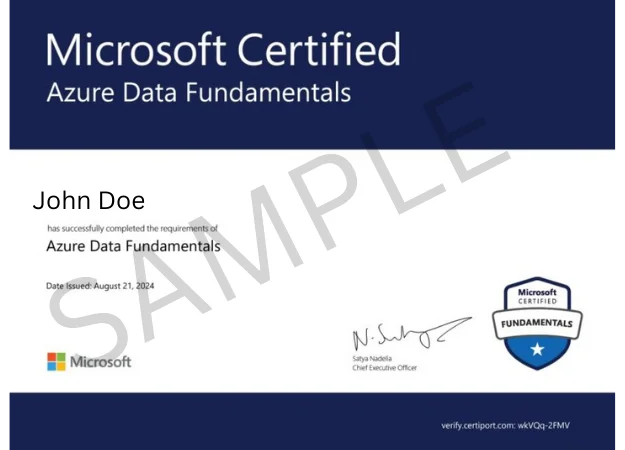
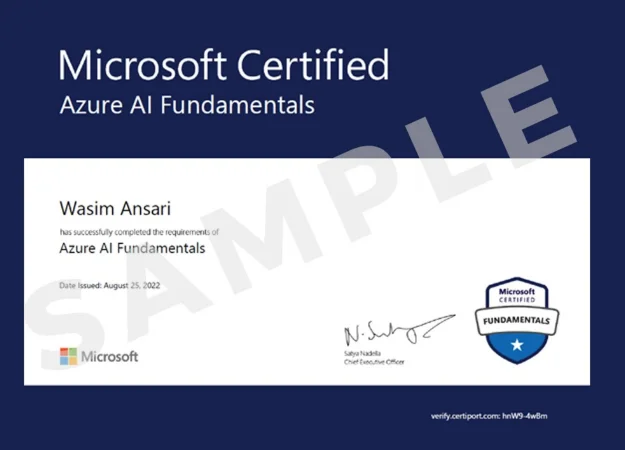
Harness Extensive Industry Network of 510+ Companies with Relevant Skills
Harness Extensive Industry Network of 510+ Companies with Relevant Skills
Access to job openings and referrals from leading firms
Unlimited job support with resume
building
Upgrade profile with industry relevant
projects
Network with professionals and experts
in the field
Access to job openings and referrals from leading firms
Unlimited job support with resume building
Upgrade profile with industry relevant projects
Network with professionals and experts in the field
Still Not Sure About The Course?
Avoid Confusion, Choose The Right Option That Suits Your Needs.
Explore a meticulously designed syllabus that blends fundamental knowledge with cutting-edge techniques. Our Data Science and Machine Learning Course offers an extensive curriculum that immerses you in practical applications.
Explore a meticulously designed syllabus that blends fundamental knowledge with cutting-edge techniques. Our Data Science and Machine Learning Course offers an extensive curriculum that immerses you in practical applications.
This unit serves as a primer for data science, introducing key tools and concepts. It’s designed to equip non-programmers with foundational Python skills, facilitating a deeper understanding and practical application throughout the course.
Module 1: Introduction To Data Science and Machine Learning
Module 2: Fundamentals of Python Programming
Tools Covered: Python, Anaconda, Jupyter, Google Colab
Module 3: Fundamentals of Statistics
Note:
Module 2 and Module 3 of Unit 1 are specially designed for non-programmers to understand the basics of computer programming and math.
This unit provides an extensive roadmap for building a robust portfolio in data science. You’ll master GitHub, a version control system, for efficient collaboration and project management. Additionally, you’ll harness LinkedIn‘s power for networking and career advancement.
Module 1: Git & GitHub (VCS)
Class Hands-On: Initiate, collaborate, and work on a real-time project
Tools Covered: Git, GitHub
Module 2: LinkedIn Profile building
This Python course introduces fundamental to advanced concepts tailored for data science applications. Learn Python step by step from basics to advanced. Learn all libraries, functions, and modules to perform data science projects by analyzing and building ML models using Python.
Module 1: Core Python Programming
Project: Build a simple calculator
Module 2: Advanced Python Programming
Class Hands-on:
25+ programs/coding exercises on data types, loops, operators, functions, generators, file I/O, reg-ex, and exception handling
Module 3: Web Scraping using Python
Project: Scrape and Analyze Data from a Website (2-3 Projects)
Module 4: OOPs in Python
Module 5: Python For Data Science
Tools Covered: NumPy, Pandas, MatplotLib, Seaborn, Beautiful Soup
EDA Project (Create Insights using Data Analytics)
2 Full-Length Projects on Data Analytics using Pandas, MatplotLib & Seaborn to analyze Data to Gain Insights and Identify Patterns.
Learn practically data mining, using SQL and NoSQL databases like MongoDB. Data visualization and analytics using Power BI & Tableau and big data analytics using Hadoop preparing students for diverse data roles.
Module 1: SQL – Structured Query Language
Hands-on practice:
Module 2: MongoDB
Tools Covered: MySQL, SQL Server, MongoDB
Module 3: Power BI
Class Project & Assignments:
Project 1: Education Institute’s student data analysis
Project 2: Sales Data Analysis
– Learn to visualize data to find patterns & insights using interactive charts
Module 4: Tableau
Class Project & Assignments:
Project 1: Supermarket data analysis
Project 2: Covid Data Analysis
– Learn to visualize data to find patterns & insights using interactive charts
– Deployment of Predictive model in Tableau
Tools Covered: Power BI, Tableau, Excel
Module 5: Excel for Analytics
Module 6: Apache Hadoop – Big Data Analytics
Tools Covered: Hadoop, Pig, Hive, HBase, Yarn MapReduce
This course provides a comprehensive overview of statistical concepts for analytics & machine learning techniques with their practical applications.
Module 1: Statistics & Probability
Class Hands-on:
Problem-solving for central tendency, ANOVA, central limit theorem & hypothesis testing Case study
You will learn machine learning algorithms, and model building from scratch to advance exploring various case studies to practice on real-world applications to reinforce your learning.
Module 1: Machine Learning using Python
Project:
Module 2: Advanced Machine Learning
Tools Covered: Pandas, Matplotlib, Sk Learn, LightGBM
Class Projects:
Note: All Machine Learning Algorithms will be covered in depth with real-time projects & case studies for each algorithm. Once Machine learning is completed, the Capstone Project will be released for the batch.
Module 3: Time-Series Forecasting
Class Projects:
Tools Covered: SciKit Learn, Pandas, Matplotlib
The NLP specialization will help you gain experience in techniques such as; text preprocessing, sentiment analysis, and building text-based models. These concepts will further help us build Machine Learning & AI models like Grammarly, ChatGPT, and Alexa.
Module 1: NLP
Class Projects:
Tools Covered: NLTK, Spacy, BERT
Deep Learning, focuses on training neural networks to build a model by studying hierarchical patterns and features from the input data. On the other hand, Prompt engineering is an act of engineering a suitable output with an efficient prompt on Generative AI tools like ChatGPT.
Module 1: Introduction to Deep Learning
Class Projects
Tools Covered: Tensorflow, Keras, PyTorch
Module 2: Prompt Engineering
ChatGPT: Prompt for text Generation (Natural Language Processing)
Dall E / Midjourney: Prompt for image Generation
Synthesia for Video Generation & Slides AI for PPT creation
Tools Covered: ChatGPT, Midjourney, Dall E, MS Copilot, Synthesia, Invideo AI, Slides AI
In this cloud deployment unit, you will learn to deploy machine learning models using AWS and Azure, two leading cloud platforms. You’ll gain proficiency in deploying, scaling, and managing models in the cloud environments through practical exercises.
Module 1: AWS
Module 2: Azure
Tools Covered: AWS, EC2, S3, ECS, Sagemaker, Lambda, Azure, Azure ML, Flask, Django
Program Highlights
This unit serves as a primer for data science, introducing key tools and concepts. It’s designed to equip non-programmers with foundational Python skills, facilitating a deeper understanding and practical application throughout the course.
Module 1: Introduction To Data Science and Machine Learning
Module 2: Fundamentals of Python Programming
Tools Covered: Python, Anaconda, Jupyter, Google Colab
Module 3: Fundamentals of Statistics
Note:
Module 2 and Module 3 of Unit 1 are specially designed for non-programmers to understand the basics of computer programming and math.
This unit provides an extensive roadmap for building a robust portfolio in data science. You’ll master GitHub, a version control system, for efficient collaboration and project management. Additionally, you’ll harness LinkedIn‘s power for networking and career advancement.
Module 1: Git & GitHub (VCS)
Class Hands-On: Initiate, collaborate, and work on a real-time project
Tools Covered: Git, GitHub
Module 2: LinkedIn Profile building
This Python course introduces fundamental to advanced concepts tailored for data science applications. Learn Python step by step from basics to advanced. Learn all libraries, functions, and modules to perform data science projects by analyzing and building ML models using Python.
Module 1: Core Python Programming
Project: Build a simple calculator
Module 2: Advanced Python Programming
Class Hands-on:
25+ programs/coding exercises on data types, loops, operators, functions, generators, file I/O, reg-ex, and exception handling
Module 3: Web Scraping using Python
Project: Scrape and Analyze Data from a Website (2-3 Projects)
Module 4: OOPs in Python
Module 5: Python For Data Science
Tools Covered: NumPy, Pandas, MatplotLib, Seaborn, Beautiful Soup
EDA Project (Create Insights using Data Analytics)
2 Full-Length Projects on Data Analytics using Pandas, MatplotLib & Seaborn to analyze Data to Gain Insights and Identify Patterns.
Learn practically data mining, using SQL and NoSQL databases like MongoDB. Data visualization and analytics using Power BI & Tableau and big data analytics using Hadoop preparing students for diverse data roles.
Module 1: SQL – Structured Query Language
Hands-on practice:
Module 2: MongoDB
Tools Covered: MySQL, SQL Server, MongoDB
Module 3: Power BI
Class Project & Assignments:
Project 1: Education Institute’s student data analysis
Project 2: Sales Data Analysis
– Learn to visualize data to find patterns & insights using interactive charts
Module 4: Tableau
Class Project & Assignments:
Project 1: Supermarket data analysis
Project 2: Covid Data Analysis
– Learn to visualize data to find patterns & insights using interactive charts
– Deployment of Predictive model in Tableau
Tools Covered: Power BI, Tableau, Excel
Module 5: Excel for Analytics
Module 6: Apache Hadoop – Big Data Analytics
Tools Covered: Hadoop, Pig, Hive, HBase, Yarn MapReduce
This course provides a comprehensive overview of statistical concepts for analytics & machine learning techniques with their practical applications.
Module 1: Statistics & Probability
Class Hands-on:
Problem-solving for central tendency, ANOVA, central limit theorem & hypothesis testing Case study
You will learn machine learning algorithms, and model building from scratch to advance exploring various case studies to practice on real-world applications to reinforce your learning.
Module 1: Machine Learning using Python
Project:
Module 2: Advanced Machine Learning
Tools Covered: Pandas, Matplotlib, Sk Learn, LightGBM
Class Projects:
Note: All Machine Learning Algorithms will be covered in depth with real-time projects & case studies for each algorithm. Once Machine learning is completed, the Capstone Project will be released for the batch.
Module 3: Time-Series Forecasting
Class Projects:
Tools Covered: SciKit Learn, Pandas, Matplotlib
The NLP specialization will help you gain experience in techniques such as; text preprocessing, sentiment analysis, and building text-based models. These concepts will further help us build Machine Learning & AI models like Grammarly, ChatGPT, and Alexa.
Module 1: NLP
Class Projects:
Tools Covered: NLTK, Spacy, BERT
Deep Learning, focuses on training neural networks to build a model by studying hierarchical patterns and features from the input data. On the other hand, Prompt engineering is an act of engineering a suitable output with an efficient prompt on Generative AI tools like ChatGPT.
Module 1: Introduction to Deep Learning
Class Projects
Tools Covered: Tensorflow, Keras, PyTorch
Module 2: Prompt Engineering
ChatGPT: Prompt for text Generation (Natural Language Processing)
Dall E / Midjourney: Prompt for image Generation
Synthesia for Video Generation & Slides AI for PPT creation
Tools Covered: ChatGPT, Midjourney, Dall E, MS Copilot, Synthesia, Invideo AI, Slides AI
In this cloud deployment unit, you will learn to deploy machine learning models using AWS and Azure, two leading cloud platforms. You’ll gain proficiency in deploying, scaling, and managing models in the cloud environments through practical exercises.
Module 1: AWS
Module 2: Azure
Tools Covered: AWS, EC2, S3, ECS, Sagemaker, Lambda, Azure, Azure ML, Flask, Django
Get a chance to win Upto 20% Scholarship
Take the test and prove your interest in Data Science and ML skill development for your better career

Get a chance to win Upto 20% Scholarship
Take the test and prove your interest in Data Science and AI skill development for your better career





















Products in the markets are
1stepGrow provides you with
100% Placement Assistance
1-1 Personal mentorship Support
No Prior Coding Required
1stepGrow Data Science and Machine Learning Course focuses on Focused Group Training with Live projects

Batch Flexibility
Three years of live class support with access to various batches and instructors

Class Recordings
Never miss a session with unlimited access to recorded classes

Real-time Doubt Clearing
Get offline feeling in online mode: unmute, ask, and clear doubts in real time

Lifetime Access
Advantage for revision: get lifetime access to class recordings and material
Invest in your future with quality education
Program Fee:
₹ 69,000
+ 18% GST
Multiple Payment Modes
Card
Banking
UPI
Payment Partner






Invest in your future with quality education
Program Fee :
₹ 69,000
+ 18% GST
Multiple Payment Modes
Card
Banking
UPI
Payment Partner





Still Not Sure About The Course?
Avoid Confusion, Choose The Right Option That Suits Your Needs.
“You remember what you do and discuss Not what you observe others doing or saying”
Three Keys to Succeed in Skills and Career
Learn by doing with expert guidance
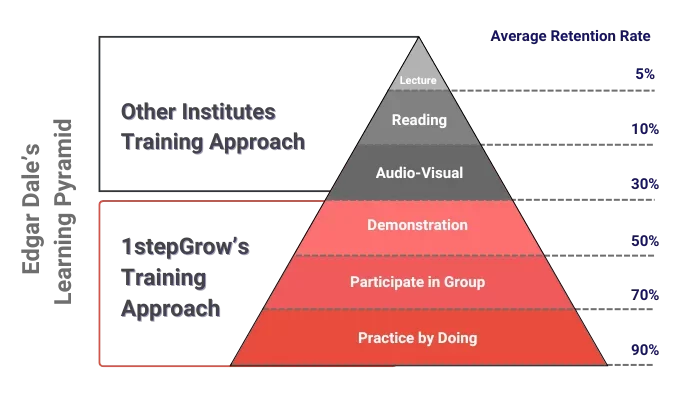
“You remember what you do and discuss Not what you observe others doing or saying”

Three Keys to Succeed in Skills and Career
Learn by doing with expert guidance
NEXT COHORTS DATES
Weekday Batch
(Mon-Fri)
Weekend Batch
(Sat-Sun)
NEXT COHORTS DATES
Weekday Batch (Mon-Fri)
Weekend Batch (Sat-Sun)
Reviews & Recommendations

Akash Deep
Coming from a mechanical background, I enrolled in 1stepgrow's Data Science program. The mentors provided exceptional support, helping me understand the concepts. Their guidance was invaluable, leading me to secure a job even before completing the program. The personalized attention and focused learning approach allowed me to ask multiple doubts and receive proper guidance.

Prathmesh
1stepGrow is an excellent training institute for Data Science. Despite being a startup, I opted for them due to their small batch size. The vibrant class environment and interactive trainers greatly enhanced my skills. The encouraging atmosphere allowed me to ask questions and actively participate. Within just 6 months, I achieved success as a Data Analyst. My journey with 1stepGrow was truly amazing.

Chinmay Rai
My experience with 1stepGrow was fantastic. Their exceptional support enabled me to transition to the Data Science team in my company. Through hands-on work in the IT domain, I gained a deep understanding of the practical aspects of being a Data Scientist. The journey was seamless, thanks to the real-world experience provided by 1stepGrow.

Ajay Chandi
Enrolling at 1stepGrow Academy has been a fantastic experience. Their knowledgeable and approachable tutors break down complex concepts into easy-to-understand explanations. Small class sizes ensure personalized attention, and the well-organized administration communicates promptly. This training helped me secure a promotion at J.P. Morgan. Overall, 1stepGrow Academy exceeded my expectations, and I highly recommend it for mastering essential corporate applications.

Vignesh S
I completed the Advanced course from
1stepGrow, and it proved to be a comprehensive learning experience. The training
included a balanced mix of theory, practical sessions, and industry projects that equipped me with real-world skills. The instructors were
knowledgeable and provided strong support throughout. With additional offerings like Microsoft Azure certification, this course is perfect for professionals looking to advance or
switch careers into the data science domain.

Get a chance to win Upto 20% Scholarship
Take the test and prove your interest in Data Science skill development for your better career
All Answers To Your Future Career
The Data Science and Machine Learning Course is for beginners and will start from the basic building blocks of data science. This course does not expect prior knowledge of programming. Prepare to be part of a life-changing discovery at this all-inclusive training center based on the industry-relevant training program to transform your career.
The Data Science and Machine Learning Course is an online data science training program designed to make the non-programmers skilled in the area of data science and AI. You’ll learn how to:
Visit the syllabus for the complete curriculum!
This is quality training with personalized attention; therefore, we have capped the maximum number of trainees per batch around 15 to 20. We realize better student-trainer interaction with smaller group sizes, ultimately leading to an enriched learning environment.
For two years, students enrolled in the Data Science with Machine Learning Course have access to live class support from mentors and job referral opportunities. It also creates a cycle of continuous learning and support for students who are in training and beyond.
Indeed, the initiative serves as a stimulus to keep students in line with the current industrial trends and their employability.
The Data Science online course lasts approximately 280 hours (around 8 months) and includes online sessions, practice projects, and training for interviews.
The course allows students to take classes on weekdays or weekends:
Weekend Batch: 8 months, Saturday and Sunday, 3 to 4 hours/day
This Data Science with Machine Learning course significantly hones the candidate’s skills and, offers exposure to the real world with real time projects. The demand for skillful data professionals has risen beyond imagination; however, this course has made the candidate even more employable and has given them highly advanced skills in the use of modern approaches and tools in data sciences, as well as industry practices that run those advanced careers, giving them an advantage in a cutthroat marketplace.
Indeed, this course comprises examinations and tests pertaining to various aspects on the Data Science online course to test one’s prowess. These separate embed assessments and projects forming part of the course wherein mastery of both the concepts and practical applications is assured. These assessments, assignments, and projects design feedback as means for improvement and to further ensure students have really been prepared for the real world.
Yes. If the requirement do arise, you may contact our support for transfer requirements, and they will find the best solutions to arrange transfer from one batch to another, as per the seat availability.
Yes, it is very much a practical course the Data Science and Machine Learning Course – where students would have to work on real-world projects to learn the skills they can apply to the real-time problems faced in data science and AI today. Such practice exposure will help build confidence and ability to work on bona-fide, industry-relevant projects.
The Data Science and Machine Learning Course in India discusses live projects based on industry data, to which sensitive information has been masked for confidentiality. Real-time projects help the students test what they have learned regarding concepts and algorithms on a real dataset, thus learning the practical experience. This course has 15 real-time industry projects, covering various scenarios, and will enable students to apply knowledge learned practically before facing challenges in the real world.
The Data Science and Machine Learning Course includes 2 Capstone projects from scratch to end. They require students to utilize their knowledge gained within real-world scenarios, providing very valuable hands-on learning experience.
Our Job Assistance Program offers you the employment assistance you need to land your dream job. It includes:
During the entire period of subscription to the Data Science and Machine Learning Course, unlimited job referrals shall be available for the students. We have been continually busy in referring your profile to our extensive network of partner consultancies and companies in order to provide maximum job opportunities.
To qualify for job assistance from 1stepGrow, you must meet these criteria:
The total fee for the Data Science and Machine Learning Course is INR 69,000/- plus 18% GST.
We offer multiple payment methods for your convenience:
Yes, we offer flexible installment options to ease the financial commitment. You can choose from various payment plans. Contact our admissions team to explore the best payment plan for your needs.
Yes, 1stepGrow offers a 15% discount for immediate registrations to upto 20% scholarship on test scores. Our counsellors will provide details about any current discounts or scholarships available for the course.
Group discounts are designed to make our program more accessible for teams or friends joining together. Here’s how it works:
This helps make learning more affordable when you bring others along.
Invite your friends to join our courses and earn exciting rewards as your referral count grows.
Earn 5% of the tuition fee for each successful referral.
– After 4 successful referrals, enjoy a 15% bonus on your own tuition fee.
– Hit 9 successful referrals and unlock a 40% bonus on your own tuition fee.
Note: These bonuses are in addition to the 5% you earn per referral!
All rewards are processed within 7–14 working days after confirmation.
Once you complete 10 successful referrals, you’ll receive a voucher for one of our programs:
– Advanced Digital Marketing Course
– Advanced Data Analytics Course
This voucher can be used by you or gifted to a friend or family member.

Have any questions in mind?
Talk to our team directly
Reach out to us and your career guide will get
in touch with you shortly
All Answers To Your Future Career
The Data Science and Machine Learning Course is for beginners and will start from the basic building blocks of data science. This course does not expect prior knowledge of programming. Prepare to be part of a life-changing discovery at this all-inclusive training center based on the industry-relevant training program to transform your career.
The Data Science and Machine Learning Course is an online data science training program designed to make the non-programmers skilled in the area of data science and AI. You’ll learn how to:
Visit the syllabus for the complete curriculum!
This is quality training with personalized attention; therefore, we have capped the maximum number of trainees per batch around 15 to 20. We realize better student-trainer interaction with smaller group sizes, ultimately leading to an enriched learning environment.
For two years, students enrolled in the Data Science with Machine Learning Course have access to live class support from mentors and job referral opportunities. It also creates a cycle of continuous learning and support for students who are in training and beyond.
Indeed, the initiative serves as a stimulus to keep students in line with the current industrial trends and their employability.
The Data Science online course lasts approximately 280 hours (around 8 months) and includes online sessions, practice projects, and training for interviews.
The course allows students to take classes on weekdays or weekends:
Weekend Batch: 8 months, Saturday and Sunday, 3 to 4 hours/day
This Data Science with Machine Learning course significantly hones the candidate’s skills and, offers exposure to the real world with real time projects. The demand for skillful data professionals has risen beyond imagination; however, this course has made the candidate even more employable and has given them highly advanced skills in the use of modern approaches and tools in data sciences, as well as industry practices that run those advanced careers, giving them an advantage in a cutthroat marketplace.
Indeed, this course comprises examinations and tests pertaining to various aspects on the Data Science online course to test one’s prowess. These separate embed assessments and projects forming part of the course wherein mastery of both the concepts and practical applications is assured. These assessments, assignments, and projects design feedback as means for improvement and to further ensure students have really been prepared for the real world.
Yes. If the requirement do arise, you may contact our support for transfer requirements, and they will find the best solutions to arrange transfer from one batch to another, as per the seat availability.
Yes, it is very much a practical course the Data Science and Machine Learning Course – where students would have to work on real-world projects to learn the skills they can apply to the real-time problems faced in data science and AI today. Such practice exposure will help build confidence and ability to work on bona-fide, industry-relevant projects.
The Data Science and Machine Learning Course in India discusses live projects based on industry data, to which sensitive information has been masked for confidentiality. Real-time projects help the students test what they have learned regarding concepts and algorithms on a real dataset, thus learning the practical experience. This course has 15 real-time industry projects, covering various scenarios, and will enable students to apply knowledge learned practically before facing challenges in the real world.
The Data Science and Machine Learning Course includes 2 Capstone projects from scratch to end. They require students to utilize their knowledge gained within real-world scenarios, providing very valuable hands-on learning experience.
Our Job Assistance Program offers you the employment assistance you need to land your dream job. It includes:
During the entire period of subscription to the Data Science and Machine Learning Course, unlimited job referrals shall be available for the students. We have been continually busy in referring your profile to our extensive network of partner consultancies and companies in order to provide maximum job opportunities.
To qualify for job assistance from 1stepGrow, you must meet these criteria:
The total fee for the Data Science and Machine Learning Course is INR 69,000/- plus 18% GST.
We offer multiple payment methods for your convenience:
Yes, we offer flexible installment options to ease the financial commitment. You can choose from various payment plans. Contact our admissions team to explore the best payment plan for your needs.
Yes, 1stepGrow offers a 15% discount for immediate registrations to upto 20% scholarship on test scores. Our counsellors will provide details about any current discounts or scholarships available for the course.
Group discounts are designed to make our program more accessible for teams or friends joining together. Here’s how it works:
This helps make learning more affordable when you bring others along.
Invite your friends to join our courses and earn exciting rewards as your referral count grows.
Earn 5% of the tuition fee for each successful referral.
– After 4 successful referrals, enjoy a 15% bonus on your own tuition fee.
– Hit 9 successful referrals and unlock a 40% bonus on your own tuition fee.
Note: These bonuses are in addition to the 5% you earn per referral!
All rewards are processed within 7–14 working days after confirmation.
Once you complete 10 successful referrals, you’ll receive a voucher for one of our programs:
– Advanced Digital Marketing Course
– Advanced Data Analytics Course
This voucher can be used by you or gifted to a friend or family member.
Have any questions in mind?
Talk to our team directly
Reach out to us and your career guide will get
in touch with you shortly
We provide online certification in Data Science and AI, Digital Marketing, Data Analytics with a job guarantee program. For more information, contact us today!
Courses
1stepGrow
Terms
Anaconda | Jupyter Notebook | Git & GitHub (Version Control Systems) | Python Programming Language | R Programming Langauage | Linear Algebra & Statistics | ANOVA | Hypothesis Testing | Machine Learning | Data Cleaning | Data Wrangling | Feature Engineering | Exploratory Data Analytics (EDA) | ML Algorithms | Linear Regression | Logistic Regression | Decision Tree | Random Forest | Bagging & Boosting | PCA | SVM | Time Series Analysis | Natural Language Processing (NLP) | NLTK | Deep Learning | Neural Networks | Computer Vision | Reinforcement Learning | ANN | CNN | RNN | LSTM | Facebook Prophet | SQL | MongoDB | Advance Excel for Data Science | BI Tools | Tableau | Power BI | Big Data | Hadoop | Apache Spark | Azure Datalake | Cloud Deployment | AWS | GCP | AGILE & SCRUM | Data Science Capstone Projects | ML Capstone Projects | AI Capstone Projects | Domain Training | Business Analytics
WordPress | Elementor | On-Page SEO | Off-Page SEO | Technical SEO | Content SEO | SEM | PPC | Social Media Marketing | Email Marketing | Inbound Marketing | Web Analytics | Facebook Marketing | Mobile App Marketing | Content Marketing | YouTube Marketing | Google My Business (GMB) | CRM | Affiliate Marketing | Influencer Marketing | WordPress Website Development | AI in Digital Marketing | Portfolio Creation for Digital Marketing profile | Digital Marketing Capstone Projects
Jupyter Notebook | Git & GitHub | Python | Linear Algebra & Statistics | ANOVA | Hypothesis Testing | Machine Learning | Data Cleaning | Data Wrangling | Feature Engineering | Exploratory Data Analytics (EDA) | ML Algorithms | Linear Regression | Logistic Regression | Decision Tree | Random Forest | Bagging & Boosting | PCA | SVM | Time Series Analysis | Natural Language Processing (NLP) | NLTK | SQL | MongoDB | Advance Excel for Data Science | Alteryx | BI Tools | Tableau | Power BI | Big Data | Hadoop | Apache Spark | Azure Datalake | Cloud Deployment | AWS | GCP | AGILE & SCRUM | Data Analytics Capstone Projects
Bangalore:
Anjanapura | Arekere | Basavanagudi | Basaveshwara Nagar | Begur | Bellandur | Bommanahalli | Bommasandra | BTM Layout | CV Raman Nagar | Electronic City | Girinagar | Gottigere | Hebbal | Hoodi | HSR Layout | Hulimavu | Indira Nagar | Jalahalli | Jayanagar | J. P. Nagar | Kamakshipalya | Kalyan Nagar | Kammanahalli | Kengeri | Koramangala | Kothnur | Krishnarajapuram | Kumaraswamy Layout | Lingarajapuram | Mahadevapura | Mahalakshmi Layout | Malleshwaram | Marathahalli | Mathikere | Nagarbhavi | Nandini Layout | Nayandahalli | Padmanabhanagar | Peenya | Pete Area | Rajaji Nagar | Rajarajeshwari Nagar | Ramamurthy Nagar | R. T. Nagar | Sadashivanagar | Seshadripuram | Shivajinagar | Ulsoor | Uttarahalli | Varthur | Vasanth Nagar | Vidyaranyapura | Vijayanagar | White Field | Yelahanka | Yeshwanthpur
Other Top Cities:
Mumbai | Pune | Nagpur | Delhi | Gurugram | Chennai | Hyderabad | Coimbatore | Bhubaneswar | Kolkata | Indore | Jaipur and More